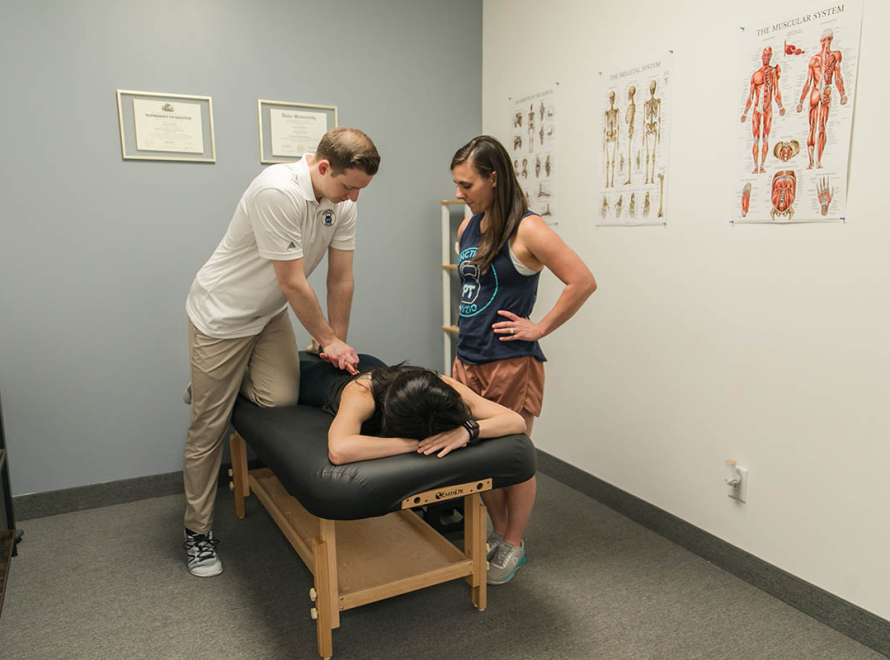Most people end up in my physical therapy office because they are either in pain or are having annoying symptoms such as pelvic pressure or incontinence. These issues can be so disruptive to normal life and it’s natural to want them resolved asap! So understandably, most patients ask me pretty soon after meeting how long it will take them to get better.
Every patient’s timeline will be different depending on a variety of factors, such as:
-
How severe symptoms are
-
How long symptoms have been present for
-
Age
-
Genetics
-
Life stressors
-
Nutrition
-
Sleep quality
-
How you feel about your symptoms
Just to name a few!
The good news is that most people will often begin to feel reduced pain and have less symptoms within the first 6 weeks of treatment (and depending again on the severity of the symptoms, some people see significant improvements within their first few visits). But true resolution of a problem, in which we take a deep dive into all the factors that led to you having symptoms to begin with, sometimes takes much longer.
This is not to discourage you, but instead to reframe your expectations so that you understand that healing can be a process which often requires patience!
You see, by the time that most patients come in to my physical therapy office, things have likely been brewing under the surface for a while. Unless you have a sudden injury like, for example, if you were tackled in sports or fell off a ladder, symptoms rarely just appear out of the blue. What happens usually looks more like this:
Over the past month, your hip has really been hurting, seemingly out of nowhere. So you make an appointment with an orthopedic doctor, who takes x-rays and tells you that you don’t need surgery, but you should probably do some physical therapy which may help or may not.
So you make a physical therapy appointment with me but, because your hip has only been hurting for a month, you figure you should only need a couple of visits tops. You honestly aren’t sure whether physical therapy will even help you, but your doctor said you should probably do a few visits before he’ll order an MRI so you’re giving it a try.
In this example, now let’s consider the other factors that I mentioned above. So even if your hip has only been acting up for a month, imagine that:
-
You’re stressed out because it’s your busy season at work, leading to increased overall muscular tension and mental exhaustion.
-
Because of the stress, you haven’t been sleeping or eating well, making you not well-nourished or well-rested, important pieces to a healthy body.
-
You stopped exercising regularly when you graduated college 10 years ago, and have since lost a lot of the strength and endurance that you used to have.
-
Over the past few years, you’ve been noticing some leaks with hard sneezes (but thought it was nothing to worry about because it only happened once in a blue moon), making it likely that you have had some degree of pelvic floor dysfunction for at least a few years.
-
You have an old ankle injury from high school volleyball, which could be limiting your ankle mobility & strength and leading to you overuse your hip as a compensation.
-
A few months ago, you had a nasty stomach bug, which likely weakened your immune system and your ability to fight inflammation right before your pain showed up.
Now, knowing all the context, it’s easy to see why addressing the ankle and the pelvic floor and even your mindset around pain would be an important part of a physical therapy plan for your hip. So even though we could probably get your hip pain to decrease significantly within a few visits, if I discharged you as soon as you felt symptom relief and didn’t address all of the contributing factors, I would be doing you a disservice as you’d likely end up right back in my office a few months later with a new case of hip pain. It’s not until we truly address root causes that we are able to see lasting changes.
At Functional Phyzio in Durham, NC, we prioritize a holistic approach in which we treat the full body so that we can help you not only resolve your symptoms, but also give you the tools to help you stay symptom-free long-term. We always say that we help you move better so that you can live better. And by that, I mean we don’t want anyone sitting on the sidelines if they want to run a marathon, or do CrossFit, or even just get on the floor to play with their kids or grandkids. If you feel like you don’t get to live the way you’d like because of pain or symptoms, contact us today for a free phone consultation!




